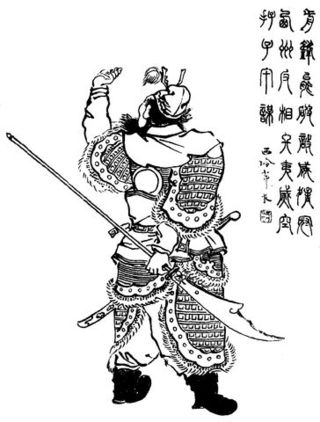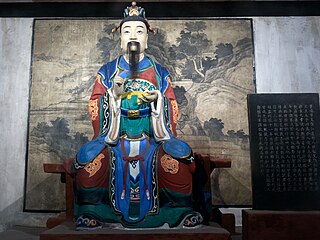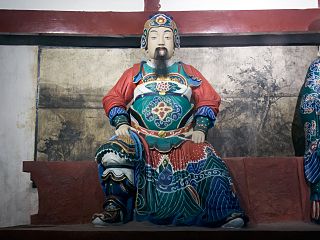
Wei Yan, courtesy name Wenchang, was a Chinese military general and politician of the state of Shu Han during the Three Kingdoms period of China. Originally a subordinate of the warlord Liu Bei in the late Eastern Han dynasty, Wei Yan rose through the ranks and became a general when Liu Bei seized control of Yi Province in 214. His performance in battle helped him to become a prominent figure in the Shu military in a short period of time. He was later appointed as the Administrator of Hanzhong Commandery and as an Area Commander in 219. Between 228 and 234, he participated actively in the Northern Expeditions led by the Shu regent Zhuge Liang against Shu's rival state, Cao Wei. After Zhuge Liang's death in c.September 234, Wei Yan was killed by another Shu general, Ma Dai, for alleged treason.

Zhuge Liang's Northern Expeditions were a series of five military campaigns launched by the state of Shu Han against the rival state of Cao Wei from 228 to 234 during the Three Kingdoms period in China. All five expeditions were led by Zhuge Liang, the Imperial Chancellor and regent of Shu. Although they proved unsuccessful and ended up as a stalemate, the expeditions have become some of the best known conflicts of the Three Kingdoms period and one of the few battles during it where each side fought against each other with hundreds of thousands of troops, as opposed to other battles where one side had a huge numerical advantage.

Jiang Wan, courtesy name Gongyan, was a Chinese military general, politician, and regent of the state of Shu during the Three Kingdoms period of China. Born in the late Eastern Han dynasty, Jiang Wan initially served as a scribe, county chief and county prefect under the warlord Liu Bei, who later became the founding emperor of Shu. After Liu Bei's son Liu Shan succeeded his father as emperor in 223, Jiang Wan gradually rose to prominence under the regency of Zhuge Liang, the Imperial Chancellor of Shu. Between 228 and 234, while Zhuge Liang was away leading Shu forces on the Northern Expeditions against Shu's rival state Wei, Jiang Wan took charge of internal affairs and provided logistical support to the Shu forces at the frontline. After Zhuge Liang's death in 234, Jiang Wan succeeded him as regent and did well in gaining the Shu people's confidence and leading them into a post-Zhuge Liang era. During this time, he considered that the land-based route through the Qin Mountains used by Zhuge Liang during the Northern Expeditions was too difficult for navigation and transportation of supplies. He thus came up with a plan to switch to a water-based route along the Han River targeting Wei territories in present-day southern Shaanxi and northwestern Hubei. However, the Shu government rejected his plan as they thought it was too risky. In 243, due to poor health, Jiang Wan relocated from Hanzhong near the Wei–Shu border to Fu County. Towards the final years of his regency, as his health worsened, Jiang Wan gradually relinquished his powers to his deputies Fei Yi and Dong Yun but he continued to rule as regent in name. He died in 246 and was succeeded by Fei Yi.
Li Yan, courtesy name Zhengfang, also known as Li Ping, was a military general of the state of Shu Han during the Three Kingdoms period of China. He climbed to the zenith of his career when he was asked by the Shu emperor Liu Bei to be the military paramountcy and co-regent alongside Zhuge Liang for his son and successor, Liu Shan. After the death of Liu Bei, Li Yan was given the rank of General of the Vanguard which was last held by Guan Yu back in 220. Li served most of his career in the mid and late 220s as the area commander for the Eastern Front centered in Yong An with Chen Dao as his deputy; he never faced any major battles in his position. However, during the 230s and the 4th of Zhuge Liang's Northern Expeditions, Li Yan was given a higher rank of General of the Agile Cavalry, below only Zhuge Liang. He was assigned to handle logistics, but he was unable to deliver supplies to Zhuge Liang's army in a timely manner. After his attempt to fraudulently cover his inability to follow commands, Li Yan was stripped from positions and power.
Zhang Yi, courtesy name Junsi, was an official of the state of Shu Han in the Three Kingdoms period of China.

Wang Ping, courtesy name Zijun, was a military general of the state of Shu Han in the Three Kingdoms period of China. Originally a military officer serving under the warlord Cao Cao. In 219, he defected to Cao Cao's rival Liu Bei during the Hanzhong Campaign. Although he was a talented orator, Wang Ping never learned to read because he joined the army at a young age. However, he did not let this disadvantage stop him and had his clerk help him with his reports. Known for his self discipline, he steadily rose through the ranks to become a senior general. During his career, he defeated Zhang He, quelled Wei Yan's alleged rebellion and was the leading commander of the Shu forces during the Battle of Xingshi. The highest position he reached was Senior General Who Guards the North (鎮北大將軍).

Fei Yi, courtesy name Wenwei, was a Chinese diplomat, military general, politician, and regent of the state of Shu during the Three Kingdoms period of China. Born in the late Eastern Han dynasty, Fei Yi started his career as an attendant to Liu Shan, the eldest son and heir apparent of Liu Bei, a warlord who became the founding emperor of Shu. After Liu Shan became emperor in 223, Fei Yi gradually rose to prominence under the regency of Zhuge Liang, the Imperial Chancellor of Shu. During this time, he concurrently served as a military adviser under Zhuge Liang and as Shu's ambassador to its ally state Wu. He also played a significant role in the conflict between the Shu general Wei Yan and Zhuge Liang's chief clerk Yang Yi. After Zhuge Liang's death in 234, Fei Yi served as a deputy to the new regent Jiang Wan and progressively assumed greater responsibilities as Jiang Wan gradually relinquished his powers due to poor health. In 244, Fei Yi led Shu forces to victory at the Battle of Xingshi against their rival state Wei and succeeded Jiang Wan as regent of Shu two years later following the latter's death. On the first day of the Chinese New Year in 253, Fei Yi was assassinated by a Wei defector, Guo Xiu.
Huang Quan, courtesy name Gongheng, was a Chinese military general and politician of the state of Cao Wei during the Three Kingdoms period of China. He previously served under the warlords Liu Zhang and Liu Bei during the late Eastern Han dynasty and in the state of Shu Han during the early Three Kingdoms period before defecting to Cao Wei. Liu Bei relied heavily on Huang Quan for counsel in both domestic and foreign policy. Under the Wei government, however, Huang Quan was restricted to only internal affairs because even though the Wei emperor Cao Pi appreciated him for his talent, he doubted Huang Quan's allegiance and believed he was still secretly loyal to Liu Bei.
Fei Shi, courtesy name Gongju, was an official of the state of Shu Han during the Three Kingdoms period of China.

Dong Yun, courtesy name Xiuzhao, was a Chinese general and politician of the state of Shu Han during the Three Kingdoms period of China. His father, Dong He, also served as an official in Shu. Dong Yun was one of four persons who held positions equivalent to a head of government in Shu from 221 to 253; the other three were Zhuge Liang, Jiang Wan and Fei Yi.

Deng Zhi, courtesy name Bomiao, was a government official, diplomat and military general of the state of Shu Han during the Three Kingdoms period of China. A descendant of Deng Yu, Deng Zhi started his career in the late Eastern Han dynasty under the warlord Liu Bei as a low-level officer in Pi County. After Liu Bei discovered his talent, Deng Zhi steadily rose through the ranks to become a county prefect and later a commandery administrator and imperial secretary. In 223, the Shu regent Zhuge Liang sent him as Shu's envoy to meet Sun Quan, the ruler of Shu's ally state Wu, and reestablish the Wu–Shu alliance against their common rival state Wei. Deng Zhi succeeded in his mission and earned praise from Sun Quan for strengthening Wu–Shu ties. In 227, Deng Zhi became a military general and he participated in the first Shu invasion of Wei by leading a decoy force with Zhao Yun to distract the Wei general Cao Zhen. Although they lost the battle, Deng Zhi and Zhao Yun managed to rally their troops to put up a firm defence during their retreat and minimise their losses. Following Zhuge Liang's death in 234, Deng Zhi rose to higher general ranks and was stationed in present-day Chongqing for about 10 years before he was recalled back to the Shu capital Chengdu in his 70s to serve as General of Chariots and Cavalry. In 248, he suppressed a rebellion in Fuling. He died in 251.

The Battle of Wuzhang Plains was fought between the contending states of Cao Wei and Shu Han in 234 AD during the Three Kingdoms period of China. The battle was the fifth and last of a series of Northern Expeditions led by Shu's chancellor, Zhuge Liang, to attack Wei. Zhuge Liang fell ill and died during the stalemate and subsequently the Shu forces retreated.

Ma Zhong, courtesy name Dexin, originally named Hu Du, was a military general of the state of Shu Han during the Three Kingdoms period of China. Liu Bei was quite impressed by Ma Zhong and praised him highly, comparing him to the recently defected Huang Quan, Ma Zhong was trusted and respected by the following head of the government Zhuge Liang, Jiang Wan and Fei Yi. After Liu Bei's death, he served under Zhuge Liang during the Southern Campaign and helped to quell the rebellion. He was appointed as the area commander in the south after Li Hui's death. He spends most of his life pacify the region and protecting the people of the south often with the help of Zhang Ni. Ma Zhong was known as a generous and whimsical man but he was also decisive in handling affairs. Hence the southern tribes both feared him and respected him. His duty in the south could be comparable to Wang Ping in the north and Deng Zhi in the east. After his death, the foreigners sorely missed him and later established a temple in his honor.
Liu Bei's takeover of Yi Province was a military campaign by the warlord Liu Bei in taking control of Yi Province from the provincial governor, Liu Zhang. The campaign took place between the years 211 and 214 in the late Eastern Han dynasty; although the conflict between Liu Bei and Liu Zhang started in January or February 213 when the latter discovered the former secret communications and subsequently executed Zhang Song. It concluded with victory for Liu Bei and his successful takeover of the province from Liu Zhang in July 214. Yi Province would serve as the foundation of the state of Shu Han during the Three Kingdoms period.
Zong Yu, courtesy name Deyan, was a military general and diplomat of the state of Shu Han during the Three Kingdoms period of China. Like Liao Hua and Zhang Yi, Zong was one of few officials who served the Shu-Han state throughout its entire existence.
Lai Min, courtesy name Jingda, was an official and scholar of the state of Shu Han during the Three Kingdoms period of China.
Wang Lian, courtesy name Wenyi, was an official of the state of Shu Han in the Three Kingdoms period of China.
Yang Xi, courtesy name Wenran, was an official of the state of Shu Han during the Three Kingdoms period of China. He is best known for writing the Ji Han Fuchen Zan, a collection of praises of notable persons who served in the Shu Han state. Chen Shou, the third-century historian who wrote the Records of the Three Kingdoms (Sanguozhi), extensively quoted and annotated Yang Xi's collection.
Li Fu, courtesy name Sunde, was an official of the state of Shu Han during the Three Kingdoms period of China.

Yang Hong, courtesy name Jixiu, was an official of the state of Shu Han during the Three Kingdoms period of China.










